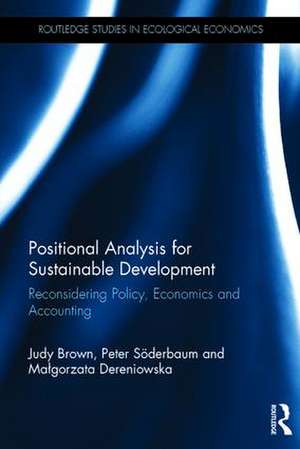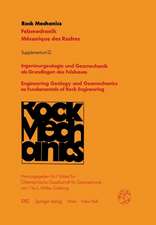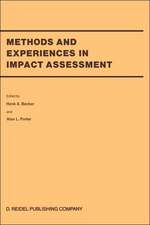Positional Analysis for Sustainable Development: Reconsidering Policy, Economics and Accounting: Routledge Studies in Ecological Economics
Autor Judy Brown, Peter Soderbaum, Malgorzata Dereniowskaen Limba Engleză Hardback – 22 mai 2017
Accordingly, approaches to decision making and accounting at the national- and business levels have to be reconsidered. Neoclassical Cost-Benefit Analysis (CBA) with focus on the monetary dimension and an assumed consensus about a specific market ideology to be applied is not compatible with democratic societies where citizen and actors in other roles normally differ with respect to ideological orientation. Environmental Impact Statements and Multi-Criteria methods are used to some extent to broaden approaches to decision-making. In this book, Positional Analysis is advocated as a multidimensional and ideologically open approach. Positional Analysis is based on a political economic conceptual framework (as part of ecological economics) that differs from neoclassical ideas of individuals, firms and markets. And since approaches to decision-making and to accounting are closely connected, a new theoretical perspective in economics similarly raises issues of how national and business accounting can be opened up to meet present demands among various actors in society. This perspective raises also numerous ethical questions at the science and policy interface that need to be properly addressed for sustainability decision making.
| Toate formatele și edițiile | Preț | Express |
|---|---|---|
| Paperback (1) | 356.44 lei 6-8 săpt. | |
| Taylor & Francis – 30 iun 2020 | 356.44 lei 6-8 săpt. | |
| Hardback (1) | 763.81 lei 6-8 săpt. | |
| Taylor & Francis – 22 mai 2017 | 763.81 lei 6-8 săpt. |
Din seria Routledge Studies in Ecological Economics
-
 Preț: 311.41 lei
Preț: 311.41 lei -
 Preț: 151.86 lei
Preț: 151.86 lei -
 Preț: 310.31 lei
Preț: 310.31 lei - 26%
 Preț: 819.09 lei
Preț: 819.09 lei - 25%
 Preț: 851.99 lei
Preț: 851.99 lei -
 Preț: 412.70 lei
Preț: 412.70 lei -
 Preț: 487.75 lei
Preț: 487.75 lei - 18%
 Preț: 1167.58 lei
Preț: 1167.58 lei -
 Preț: 397.54 lei
Preț: 397.54 lei -
 Preț: 482.53 lei
Preț: 482.53 lei -
 Preț: 483.55 lei
Preț: 483.55 lei - 26%
 Preț: 987.21 lei
Preț: 987.21 lei -
 Preț: 417.20 lei
Preț: 417.20 lei -
 Preț: 418.35 lei
Preț: 418.35 lei - 14%
 Preț: 341.66 lei
Preț: 341.66 lei - 11%
 Preț: 336.99 lei
Preț: 336.99 lei - 15%
 Preț: 423.09 lei
Preț: 423.09 lei - 18%
 Preț: 1167.36 lei
Preț: 1167.36 lei -
 Preț: 482.35 lei
Preț: 482.35 lei - 13%
 Preț: 295.07 lei
Preț: 295.07 lei -
 Preț: 480.62 lei
Preț: 480.62 lei -
 Preț: 421.66 lei
Preț: 421.66 lei - 13%
 Preț: 296.68 lei
Preț: 296.68 lei - 18%
 Preț: 1171.54 lei
Preț: 1171.54 lei - 19%
 Preț: 246.67 lei
Preț: 246.67 lei - 18%
 Preț: 1057.75 lei
Preț: 1057.75 lei - 28%
 Preț: 823.44 lei
Preț: 823.44 lei -
 Preț: 492.16 lei
Preț: 492.16 lei - 18%
 Preț: 1064.19 lei
Preț: 1064.19 lei -
 Preț: 413.13 lei
Preț: 413.13 lei - 18%
 Preț: 1168.37 lei
Preț: 1168.37 lei - 15%
 Preț: 421.29 lei
Preț: 421.29 lei - 18%
 Preț: 1058.79 lei
Preț: 1058.79 lei - 18%
 Preț: 1057.75 lei
Preț: 1057.75 lei - 18%
 Preț: 1162.84 lei
Preț: 1162.84 lei - 18%
 Preț: 1171.89 lei
Preț: 1171.89 lei - 26%
 Preț: 822.54 lei
Preț: 822.54 lei
Preț: 763.81 lei
Preț vechi: 1102.55 lei
-31% Nou
Puncte Express: 1146
Preț estimativ în valută:
146.16€ • 156.29$ • 121.86£
146.16€ • 156.29$ • 121.86£
Carte tipărită la comandă
Livrare economică 17 aprilie-01 mai
Preluare comenzi: 021 569.72.76
Specificații
ISBN-13: 9781138634503
ISBN-10: 1138634506
Pagini: 180
Ilustrații: 8
Dimensiuni: 156 x 234 x 16 mm
Greutate: 0.43 kg
Ediția:1
Editura: Taylor & Francis
Colecția Routledge
Seria Routledge Studies in Ecological Economics
Locul publicării:Oxford, United Kingdom
ISBN-10: 1138634506
Pagini: 180
Ilustrații: 8
Dimensiuni: 156 x 234 x 16 mm
Greutate: 0.43 kg
Ediția:1
Editura: Taylor & Francis
Colecția Routledge
Seria Routledge Studies in Ecological Economics
Locul publicării:Oxford, United Kingdom
Public țintă
Postgraduate and UndergraduateCuprins
Table of Contents:
List of Figures
List of Tables
Foreword
Acknowledgements
Chapter 1: Democracy as a lead concept in dealing with sustainable development (Peter Söderbaum)
Chapter 2: Fundamentals of sustainability economics and positional analysis (Peter Söderbaum)
Chapter 3: Mainstream economics and alternative perspectives in a political power game (Peter Söderbaum)
Chapter 4: Positional analysis as an approach to decision-making, accounting and democracy (Peter Söderbaum)
Chapter 5: On the need for broadening out and opening up accounting (Judy Brown)
Chapter 6: Positional analysis in relation to other pluralistic accounting practices (Judy Brown)
Chapter 7: Sustainability, ethics, and democracy: A pluralistic approach to the navigation of disagreements (Małgorzata Dereniowska)
Chapter 8: Positional analysis and practical ethics (Małgorzata Dereniowska)
Chapter 9: Democracy, sustainability and positional analysis: An interview with Peter Söderbaum (with introduction by Judy Brown)
Chapter 10: Philosophy, ethics and positional analysis: An interview with Peter Söderbaum (with introduction by Małgorzata Dereniowska)
Appendix: The early history of positional analysis (Peter Söderbaum)
Index
List of Figures
List of Tables
Foreword
Acknowledgements
Chapter 1: Democracy as a lead concept in dealing with sustainable development (Peter Söderbaum)
Chapter 2: Fundamentals of sustainability economics and positional analysis (Peter Söderbaum)
Chapter 3: Mainstream economics and alternative perspectives in a political power game (Peter Söderbaum)
Chapter 4: Positional analysis as an approach to decision-making, accounting and democracy (Peter Söderbaum)
Chapter 5: On the need for broadening out and opening up accounting (Judy Brown)
Chapter 6: Positional analysis in relation to other pluralistic accounting practices (Judy Brown)
Chapter 7: Sustainability, ethics, and democracy: A pluralistic approach to the navigation of disagreements (Małgorzata Dereniowska)
Chapter 8: Positional analysis and practical ethics (Małgorzata Dereniowska)
Chapter 9: Democracy, sustainability and positional analysis: An interview with Peter Söderbaum (with introduction by Judy Brown)
Chapter 10: Philosophy, ethics and positional analysis: An interview with Peter Söderbaum (with introduction by Małgorzata Dereniowska)
Appendix: The early history of positional analysis (Peter Söderbaum)
Index
Descriere
Approaches to decision making and accounting at the national- and business levels have to be reconsidered in light of climate change, biodiversity loss, pollution of land and water, land-use changes, lack of equality and other problems. Cost-Benefit Analysis is clearly not helping to address these issues. In this book, Positional Analysis is advocated as a multidimensional and ideologically open approach. Positional Analysis is based on a political economic conceptual framework (as part of ecological economics) that differs from neoclassical ideas of individuals, firms and markets. It also raises issues of how national and business accounting can be reconfigured to meet these challenges.





























